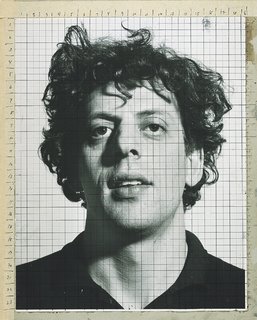I Met Philip Glass!

A review of the performance I attended
This of course was the world premiere of Frans Lanting's and Philip Glass' Life: A Journey Through Time, premiered last Saturday in Santa Cruz, California. (For the geographically challenged, that is about an hour from Hollister, the real location of this blog.) The multimedia spectacle consisted of moving photographs being projected onto a rather large screen that tell the story of the evolution of life on earth with an orchestra playing live as the soundtrack to the film. It wasn't the best Philip Glass performance I have attended, but it continued to confirm my opinion of Glass as the world's greatest living composer, and probably the greatest composer in a very long time.
The music was "recycled" in a manner of speaking. Glass said in a talk after the premiere that he felt he was listening to his "greatest hits", but these were the greatest hits that no one knew about. Indeed, while some orchestral transformations of these pieces seemed a little over-the-top (notably the transcription for orchestra of the overture of his opera, Les Enfants Terribles), some orchestrations were quite rewarding, notably the last movement of the suite that was originally used for a little-known soundtrack. Glass also said that he felt that this is a new path that his career as a musical collaborator is taking. Though he has worked in stage, film, and many other media, he had yet to work with still photographs. Glass, who considers himself first and foremost as a composer of performance music, thus expressed that this experience is rounding him out as a composer as he pushes toward his seventieth birthday.
I should here defend my position on why I think Glass is such a great musical genius when he is often maligned by musical experts and connoisseurs. I like to think that if you really like a style of music, you can listen to it all day long and not be bored by it. Sure, I love listening to Bach, Mozart, Alban Berg, or Steve Reich, but their music becomes very tiring after a while. Glass' music, with its complex simplicity, its lyricism, and its romanticist insistence in even its most avant-garde form, never bores me and continues to excite me after years and years. Not that I think everything he writes is musical gold. He has, however, written enough masterpieces that his place in the musical pantheon at least for me has been more than sealed.
After the last talk after this performance, I decided to make my move toward the stage where Glass was seated during the talk. Being that no one tackled me nor was I struck by lightening by the music gods, I went up and merely said:
"My Glass, I have always wanted to meet you."
Glass responded, "Well, here we are."
"I have been a fan of your music since I was fourteen. For me, you are one of the greatest composers who ever lived. Your music has really changed my life."
[This is not an exaggeration. His music has formed how I think and approach the world: vibrantly, romantically, and insistently. There have been days that only a musical piece by him has kept me going.]
"Well, thank you," he said in response to my adolescent praise. "He looked around pensively, "We really did something special here tonight."
I said farewell and walked into the cool summer night. I think I literally said to some stranger, "I just met Philip Glass. This is so cool!"



2 Comments:
Wow, talk about the "Beatific Vision"! That must have been super exciting. Too bad you didn't get a picture!
ninest123 16.01
louis vuitton, michael kors outlet, ray ban sunglasses, tiffany and co, louis vuitton, chanel handbags, replica watches, ugg boots, prada outlet, tiffany jewelry, oakley sunglasses, louis vuitton outlet, nike air max, oakley sunglasses, prada handbags, burberry outlet online, ray ban sunglasses, replica watches, longchamp outlet, oakley sunglasses, jordan shoes, oakley sunglasses, michael kors outlet, ugg boots, louis vuitton, polo ralph lauren outlet, uggs on sale, burberry, michael kors outlet, longchamp, ugg boots, gucci outlet, michael kors, nike outlet, louis vuitton outlet, louboutin outlet, louboutin, polo ralph lauren outlet, nike air max, nike free, christian louboutin outlet, michael kors outlet, michael kors outlet, cheap oakley sunglasses, ugg boots, ray ban sunglasses, longchamp outlet, louboutin shoes, tory burch outlet
Post a Comment
<< Home